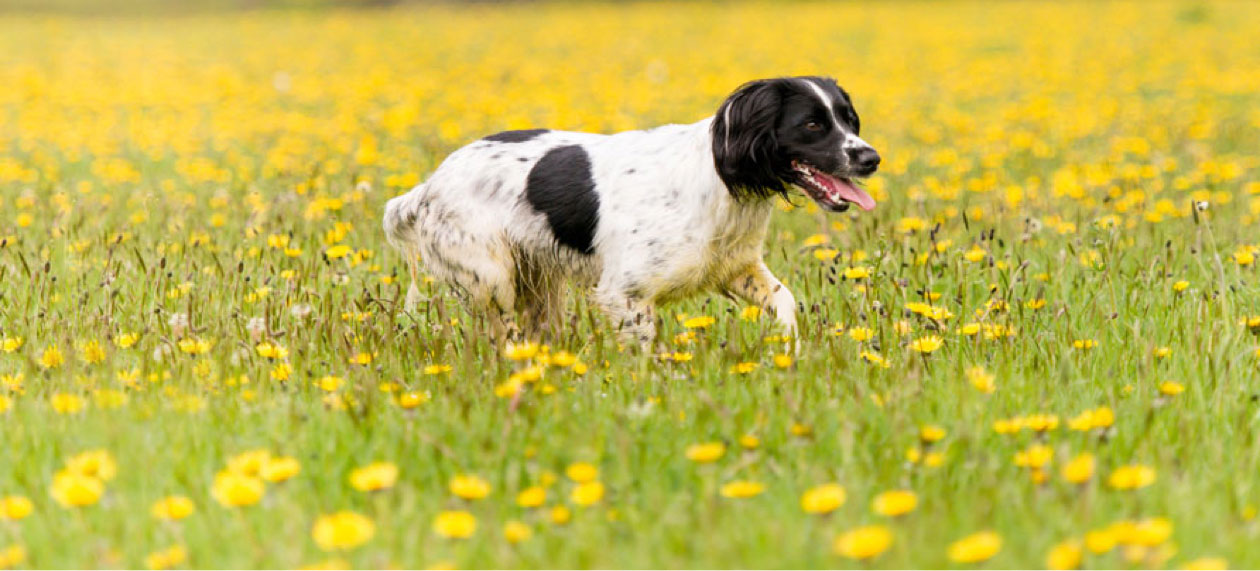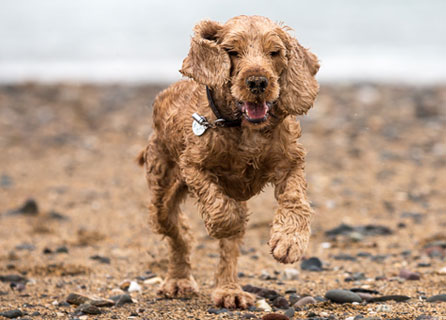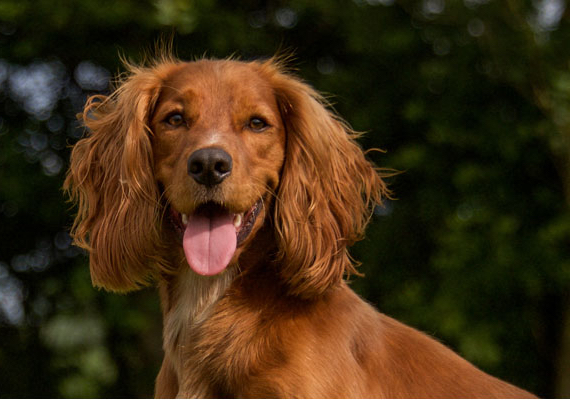
Cocker Spaniel breed guide
Playful, intelligent and friendly, it’s little wonder the English Cocker Spaniel is one of the most popular of the spaniel family. From grooming advice to common health conditions, our guide covers the key things you should know about this affectionate, animated dog, known for their constantly wagging tail.
Breed information and advice
The Cocker Spaniel is a member of the gundog breed group, and whether they're a show or working Cocker, their main aim in life is to please their owner. They love going out for walks, but always use a lead and don’t be surprised if their hunting instinct kicks in, causing them to chase birds or squirrels. Here’s more you should know:
- Cocker Spaniels display their retrieving abilities around the house, so you’ll regularly find them with a toy or a slipper in their mouth.Cocker Spaniels display their retrieving abilities around the house, so you’ll regularly find them with a toy or a slipper in their mouth.
- Their medium-length coat needs grooming every day to avoid it becoming tangled.Their medium-length coat needs grooming every day to avoid it becoming tangled.
- They will typically weigh between 12kg to 16 kg when fully grown.They will typically weigh between 12kg to 16 kg when fully grown.
- This breed of dog can usually live between 12 to 15 years.This breed of dog can usually live between 12 to 15 years.
Cocker Spaniel: Small: 38cm-41cm

Recommended exercise and nutrition
A hunter at heart, the Cocker Spaniel loves getting out and about. While they will be happy enough having a run around the back garden, they'll also need exercise for up to an hour a day to keep them in good shape, depending on their ability and medical history. Being a keen learner, along with their innate willingness to please, this dog is great in sports or obedience competitions.
This breed has a great appetite and, given half the chance, a Cocker Spaniel could overeat. It is better to ignore their pleading eyes and discourage begging. Instead, treat them with some of their food allowance to encourage good behaviour, without risking diarrhoea and adding extra calories.
Feed your dog a measured, daily amount of good quality dry food, following the instructions on the packet. Food amounts will vary according to the size and age of your dog, and the type of food, so be sure to read the guidance on the pack.
Up to one hour of exercise per day
Your dog loves to be active and they’ll be better behaved if they're regularly outdoors with you and able to play.

Common health problems and illnesses
There’s no reason why your Cocker Spaniel shouldn’t live a long and happy life. However, being aware of the ailments your dog will be more prone to, along with the associated symptoms, can help you to deal with any health issues that crop up.
Atopy, or atopic dermatitis, is itchy skin that is caused by an allergic response to environmental allergens. Symptoms of Atopy include itching on affected skin areas, frequently face, feet, armpits, front legs, and abdomen. Your Cocker Spaniel may also experience Otitis Externa - a type of inflammation of the external ear canal. You can reduce the risk of this flaring up by gently cleaning your dog's ears once a week using a mild ear cleaner. This is also recommended after swimming. Anal gland problems are also linked to Atopy. You may be aware of a strong, fishy odour and notice your dog scooting along the ground or licking their bottom often. Take them to the vet if you suspect this issue. The glands will be emptied and checked for signs of infection.
A common injury affecting this breed is a dislocated kneecap, also known as a luxating patella. This is a condition that they’ll have been born with, and signs to look out for include occasional skipping or hind-leg lameness. Simple surgery is usually the best way to treat this condition, but your vet can advise on the best course of action.
Hip dysplasia is where the ball and socket of the dog’s hip do not fit properly leading to the deterioration of the bone and loss of function of the joint. This damage causes swelling, pain and arthritis so it’s vital to identify the disease as early as possible to be able to manage or avoid discomfort for your dog. If your Cocker Spaniel starts having trouble standing up and jumping, this can be an early sign. Other symptoms to look for are swaying when they walk, joint pain, stiffness and a decreased range of motion. Hip dysplasia can be made worse by obesity, and exercising them too much or too little. It can be eased by anti-inflammatory medication, physical therapy or - in some cases - surgery.
If you see a cloudy haze forming on your Cocker Spaniel’s eyes, it might be cataracts. When a dog gets cataracts the lens clouds stopping light from reaching the back of the eye which impairs vision and is what can lead to blindness. This condition will worsen over time and can be treated quite successfully if caught early. Usually, if your Cocker does get cataracts it will develop in both eyes. If it's only in one eye the odds are it's related to an injury. Don’t let a cataract go without being managed, assessed, and treated by your vet.
Find out about insurance for your Cocker Spaniel
Learn how pet insurance works and what kind of cover you might need for your dog.
Grooming advice
Your Cocker Spaniel is renowned for their beautiful, glossy coat - but it does need maintaining. They need dedicated grooming so many owners choose to have a professional groomer trim, bathe and brush their dog’s coat every six weeks or so. However, daily brushing is also important, as it prevents their coat from getting matted or tangled.
Clean their ears once a week, to keep them clear of moisture and wax build-up and to prevent any infections, but don’t re-use cotton wool balls or buds on both ears.
Introduce your dog to the grooming process in their puppy years if possible - get them used to it as early as you can, so that it becomes part of the daily routine for both of you.
Fun and interesting facts
- Cocker Spaniels originated from Spain and were so named because of their great ability in the field of hunting woodcock.
- There are two distinct strains of this breed - the working type and the show type. Working Cockers are bred for hunting in the shooting field, while the show strain makes for a great family pet and can often be seen on the stage at Crufts.
- Disney’s 1955 classic film Lady and the Tramp features a Cocker Spaniel as the leading 'Lady'.
- The royals, William and Kate, the Duke and Duchess of Cambridge have a Cocker Spaniel.
- And it’s been the breed of choice for many US presidents too, including Richard Nixon and Harry S Truman.
Important information
The content on this page aims to offer an informative introduction to pet breeds, but does not constitute expert veterinary advice. If your dog or cat falls ill or has an injury, contact your vet immediately.
All facts and figures were correct at date of publication and were compiled using a range of sources.
Discover more breeds
Browse our other cat and dog guides to learn about some of the UK’s most popular breeds.